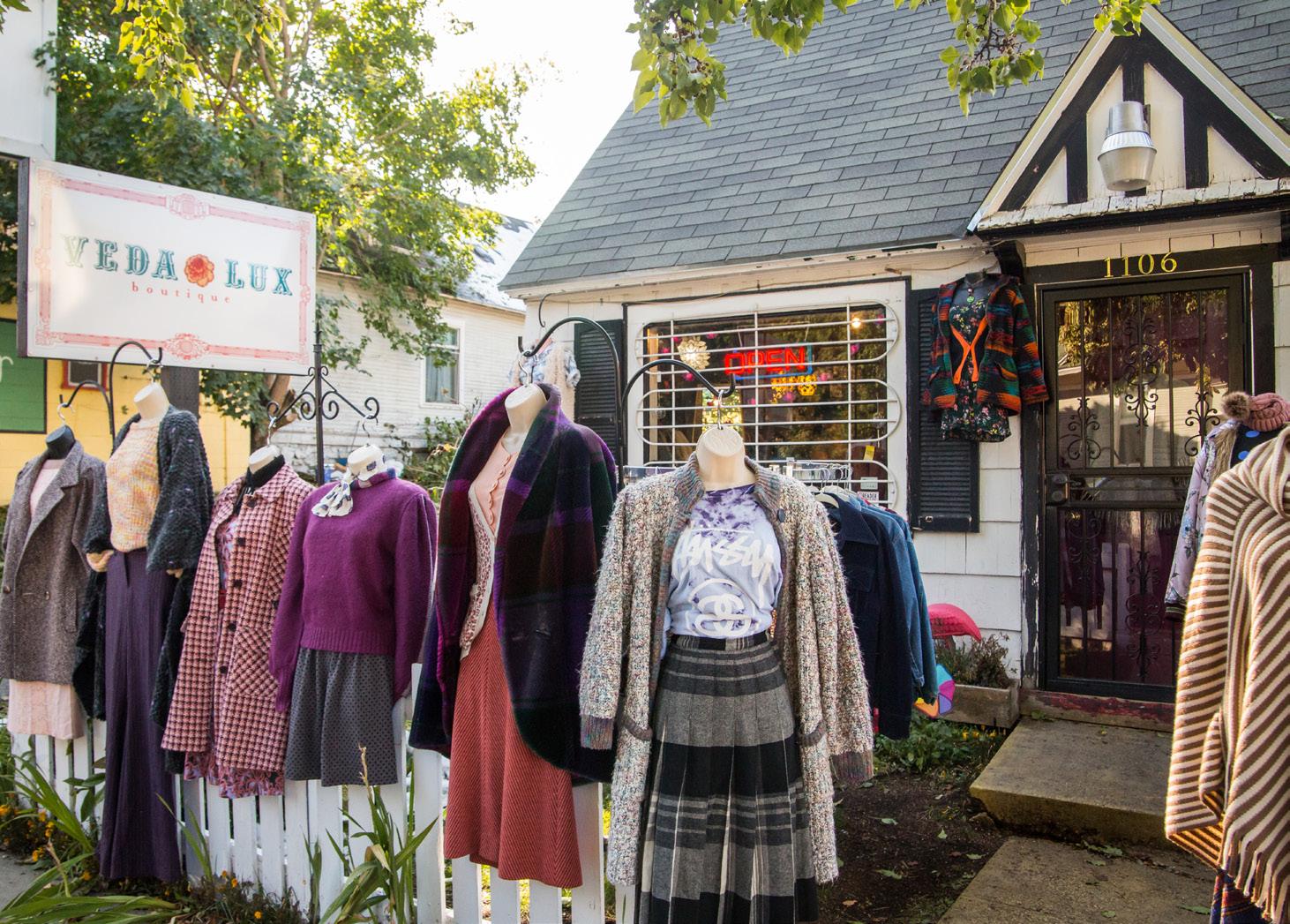
4 minute read
COMMUNITY ENGAGEMENT
GOAL 3. EQUITABLE GROWTH
Seek to understand, address, and dismantle outcome disparity through intentional initiatives that include all Spokane residents in the benefits of economic growth and prosperity.
Advertisement
Image of Black London in the Browne's Addition Neighborhood, courtesy of the Live Local INW Coalition Certain geographies in Spokane County have been largely overlooked for major development projects for too long. These areas have been inequitably perceived as ill-suited for real estate investment and business development, in part because of missing critical infrastructure. Meanwhile, certain populations within Spokane have experienced systematic exclusion from full participation in many aspects of economic prosperity. This reality must change if the Spokane region wants to achieve its goal of maintaining diversity, equity, and inclusion (DEI) as core values. All regional economic development initiatives must include a racial justice outcomes analysis so that equity efforts in the Spokane economy are not siloed or sidelined alongside traditional economic development activities. Prioritizing funding for equitable growth initiatives until racial and other social disparities are no longer significantly measurable in the market is essential to change the unequal opportunity landscape. Equitable economic growth should be considered as both a process and an outcome. It is a process in that initiatives, programs, and policies must be developed and delivered by impacted communities to ensure inclusive community engagement that centers diverse experiences and reduces historic and existing barriers to full participation in the local, regional, national, and global economy. Equitable growth becomes an outcome once a person’s identity or identities no longer impacts their ability to experience the benefits of economic growth or prosperity. By making intentional investments and prioritizing resources for underserved geographies and populations, the region can collectively work toward implementing equitable growth initiatives that preserve and advance economic opportunity for all Spokane residents.

STRATEGIES AND ACTIONS
3.1 Prioritize sustainable funding for coalitions, including the Business Equity
Coalition of the Inland Northwest and the Multi-Ethnic Development Council, that are accountable to the communities they serve in addressing DEI issues, building trust, creating strong communication channels, and fostering collaboration across Spokane County (see Action 1.3.2 and Strategy 4.4). 3.1.1. Convene human resource professionals on a regular basis to understand barriers and opportunities to drive equity in the private sector. • Encourage employers to revisit their human resource processes to promote more inclusive and equitable hiring practices. Activities to consider include studying the current skills and experiences listed on job postings and removing unnecessary requirements and connecting businesses with tools and resources to develop earnand-learn models (such as pre-apprenticeships, apprenticeships, on-the-job training, incumbent worker training, and internships). • Identify metrics to evaluate business equity in Spokane County. 3.1.2. Deploy resources for community organizations on topics such as decolonization and antiracism, consensus building, and government relations.
Example: The Future Ground Network began as a pilot program in Ontario and Quebec, Canada, to convene and mentor the nonprofit environmental community. The online resource hub provides monthly trainings and toolkits on topics ranging from the Land Back movement (returning Native lands back to Indigenous populations) to campaign strategizing and grant writing, for community service providers. In 2021, the program expanded across Canada and now serves over 3,000 members and 150 organizations.
3.2 Devote resources to and build capacity of an ecosystem of support by and for BIPOC business owners, including community development financial institutions (CDFIs) and early stage business funding (see Action 1.2.2). 3.2.1. Elevate the region’s buy local campaigns, such as Live Local INW, to support locally owned BIPOC and small businesses. 3.2.2. Convene financial lending organizations (banks, CDFIs, credit unions) to improve collaboration on loans and long-term, flexible financing options available to BIPOC business owners. • Explore alternate funding tools, like co-ops, to provide BIPOC business owners with other forms of innovative financing. 3.2.3. Support Indigenous businesses and Tribes seeking funding opportunities for community and business investment. 3.3 Drive equitable economic and workforce development by targeting investments and resources in communities and populations that need them most (see Action 2.1.2). 3.3.1. Incorporate community benefit agreements for companies recruited to Spokane and for new public and private projects developed by regional corporations and institutions. • Draft these agreements in a manner that gives preference to contracting with firms that are locally owned, those which have a diverse ownership and workforce, in addition to those which utilize apprenticeship programs. 3.3.2. Reduce barriers to public-private development projects in priority areas to attract additional investment, promote real estate development by community-based entities, and job growth from locally owned businesses, while pursuing policies and processes to stabilize communities and mitigate gentrification (see Strategy 2.2). • Create community-based financing mechanisms that provide business and real estate ownership opportunities for more community members. • Explore vacancy taxes for undeveloped land and parking lots to reduce displacement pressure in historically underinvested areas. 3.3.3. Recruit and fund housing industry innovators to lead the rapid development of more privately owned, permanently affordable housing, such as apartment cooperatives, conversion of mobile and/or manufactured home parks to resident-managed nonprofit associations, development of multiple limited-equity microvillage infill developments, and cohousing communities in a variety of formats (see Action 2.2.4). • Plan for the protection and incremental expansion of transportationoriented business districts by increasing allowable housing and commercial densities in these areas (see Strategy 4.1).
Image of Veda Luxe Boutique in the Perry District by Libby Kamrowski courtesy of Visit Spokane

